Flowers in the Attic Blu-ray Movie
HomeFlowers in the Attic Blu-ray Movie 
Image Entertainment | 1987 | 92 min | Rated PG-13 | Sep 09, 2014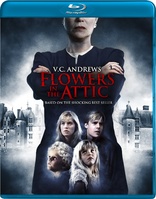
Movie rating
6 | / 10 |
Blu-ray rating
| Users | 0.0 | |
| Reviewer | 3.0 | |
| Overall | 3.0 |
Overview
Flowers in the Attic (1987)
After the death of her husband, a mother takes her children to live with their grandparents in a remote mansion. However, the children are kept locked in a room just below the attic, visited only by their stern grandmother and their mother, who becomes less and less concerned about them and their failing health, and more concerned about herself and the inheritance she plans to win back from her dying father.
Starring: Louise Fletcher, Victoria Tennant, Kristy Swanson, Jeb Stuart Adams, Ben Ryan GangerNarrator: Clare Peck
Director: Jeffrey Bloom
| Mystery | 100% |
| Thriller | Insignificant |
| Drama | Insignificant |
Specifications
Video
Video codec: MPEG-4 AVC
Video resolution: 1080p
Aspect ratio: 1.85:1
Original aspect ratio: 1.85:1
Audio
English: DTS-HD Master Audio 2.0 Mono (48kHz, 24-bit)
Subtitles
English SDH
Discs
25GB Blu-ray Disc
Single disc (1 BD)
Playback
Region A (locked)
Review
Rating summary
| Movie | 2.5 | |
| Video | 3.0 | |
| Audio | 4.0 | |
| Extras | 0.0 | |
| Overall | 3.0 |
Flowers in the Attic Blu-ray Movie Review
Hothouse Gothic
Reviewed by Michael Reuben September 16, 2014Novelist V.C. Andrews retained script approval rights over the screen adaptation of her first novel, Flowers in the Attic, published in 1979, but she did not live to see the finished film, which was released in 1987 and bears a dedication to her memory. The production was notoriously troubled. Part of the reason for the book's success was its controversial subject matter, which involved open incest between siblings and caused the book to be banned from several school libraries. A successful film would have to downplay the novel's more controversial elements, which is probably why the producers themselves rejected the script penned by Wes Craven, fresh off the success of A Nightmare on Elm Street. Andrews herself eventually blessed a screenplay by Jeffrey Bloom, whose most notable credit up to that point was the 1980 horror film Blood Beach. Bloom directed his script, only to walk off the picture after the completion of principal photography when the producers insisted on changing the ending. The result, edited and completed without the director's participation, was savaged by both critics and loyal fans of the novel, but it sold enough tickets to recoup its costs, primarily because the producers had refused to spend any money hiring known actors, except for Oscar winner Louise Fletcher (One Flew Over the Cuckoo's Nest). Flowers in the Attic has since been remade as a Lifetime TV movie in a version that hews more closely to the novel, but the original film retains a weird fascination because of the way Bloom's script tiptoes up to the edge of the story's riskier sexual themes but never quite plunges in. The effect, whether or not it was intentional, is to give the sexual undercurrent even greater emphasis. You're constantly being reminded of what the film is working so hard to avoid.
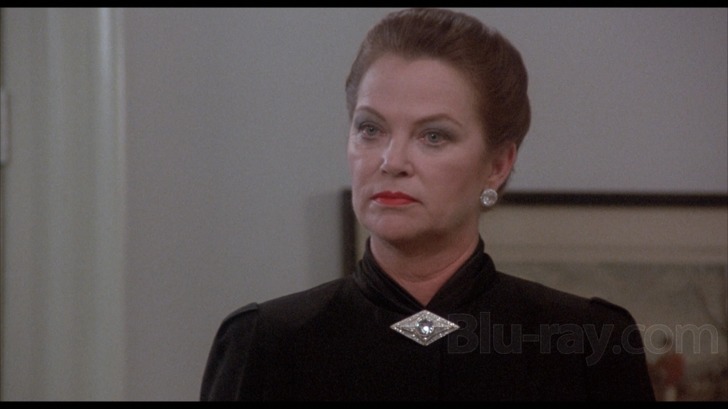
Flowers in the Attic takes place in a hermetically sealed, artificial world where last names are omitted and practical details like occupations don't matter. (The book included such details.) The narrator (Clare Peck) is the adult Cathy, the second of four children, who is played as a teenager by Kristy Swanson. (Swanson would become better known five years later for originating the role of Buffy the Vampire Slayer.) Cathy's older brother is Chris (Jeb Stuart Adams), and her two younger siblings are fraternal twins, a boy, Cory (Ben Granger), and a girl, Carrie (Lindsay Parker). They lead a loving and idyllic existence with their Mother (Victoria Tennant, L.A. Story), whose name is Corinne, and Father (Marshall Colt, Jagged Edge). Still, one can't help but notice something odd in the way that Father brings twelve-year-old Cathy a special present when he returns from a business trip and waits until everyone else has gone to sleep before giving it to her. He says that she's his "favorite", which seems innocent enough until later when more of the family history is revealed. The family's life changes forever when police arrive at the door on Father's thirty-sixth birthday to deliver the tragic news that he has been killed. When the money runs out, Corinne takes her children to the chilly but palatial estate of her wealthy estranged parents, Grandmother (Fletcher) and Grandfather (Nathan Davis). Corinne's plan is to win her way back into the heart of Grandfather, who is dying, so that he'll write her back into his will. She clearly has no chance with Grandmother, who despises her daughter and her grandchildren with equal fervor. For reasons revealed during the course of the film, she considers the marriage between Mother and Father to be unholy and the children to be "abominations". She will allow them to stay with her, but only under the strictest limitations. Writer/director Bloom may not have felt free to depict the novel's sexual relationship between adolescent siblings Cathy and Chris, but he certainly doesn't hesitate to show the medieval punishment inflicted by Grandmother on her daughter or the inhumane treatment she imposes on her four grandchildren, including locking them away and withholding food for days at a time. As the older children point out, Grandmother's treatment doesn't even make sense. She insists that they behave "modestly", then forces two boys and two girls to share a common bedroom and bathroom. Why should she be surprised to find Chris talking to his sister while she relaxes in the tub? (Not that Grandmother's suspicions are wrong; both that scene and others are staged as suggestively as possible.) The children's only refuge is the mansion's huge attic, which is reached through a door in the closet. Filled with books, games, vintage clothing and all manner of artifacts, it becomes their playground and makeshift school (since they are also being denied an education). It's there the four children pass the hours as days turn into months and their Mother's visits become less frequent, eventually ceasing altogether. When Corinne finally reappears, announcing the "happy" news that she's won back Grandfather's love, she is a changed woman, distant, expensively attired and apparently unconcerned about her children's suffering and isolation. From this point onward, Flowers in the Attic spirals toward its looney but logical conclusion with gothic inevitability. For all the sexual tension in the air, the entire story is really about money: who has it, who doesn't and who has the power to bestow it. In the brief scenes between Corinne and the ailing Grandfather, Bloom seems to be suggesting the image of a fading vampire feeding off a younger life, trying to hold on for just a little longer—for a price, of course. In the novel, Andrews left open various possibilities that were pursued in a series of sequels, but the film's ending—reshot by the producers after the director left the production—provides more of a reckoning and a sense of closure.
Flowers in the Attic Blu-ray Movie, Video Quality 
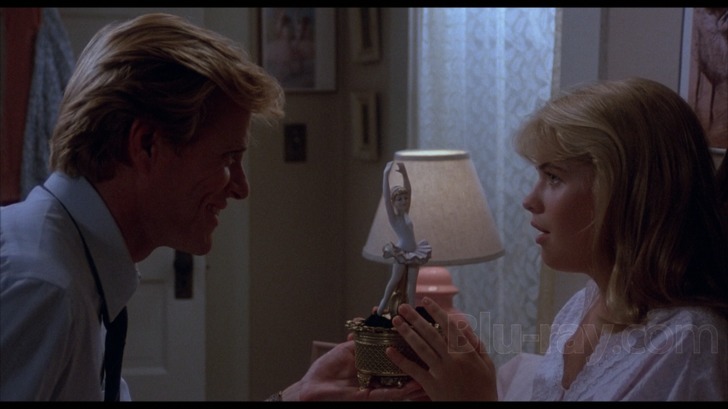
Two cinematographers are credited for Flowers in the Attic, Frank Byers (Twin Peaks) and Gil Hubbs (Enter the Dragon). The film's limited budget is reflected in its sets and locations, but the lighting is professional and was obviously intended to create a dreamy, otherworldly effect with a gauzy texture. The source material used by Image Entertainment for its 1080p, AVC-encoded Blu-ray is in adequate shape, with some minor speckling and an occasional splotch or streak that lasts for usually no more than a frame. The image will probably underwhelm those Blu-ray afficionados who expect every disc to feature a razor-sharp picture, regardless of how the film was shot, but the soft, somewhat grainy appearance is true to the source material and could not look substantially better without the kind of digital manipulation that would transform film into wax-like video. There is substantial picture detail to be seen within the grain field when the image is moving. The major criticism of the image is the blacks, which aren't always true black but sometimes shade into dark gray, a phenomenon most readily observed in Grandmother's daytime attire, which is always funereal. As for the rest of the color palette, most scenes tend toward light, pastel or just plain faded tones, in keeping with the ethereal sense that the film attempts to sustain. Only in the world of the grandparents does the image occasionally display darker, more severe shades. With no extras, Image has supplied the 92-minute film at a relatively high average bitrate of 28.95 Mbps, which is essential for an image with such a heavy grain pattern. Compression errors are not an issue.
Flowers in the Attic Blu-ray Movie, Audio Quality 
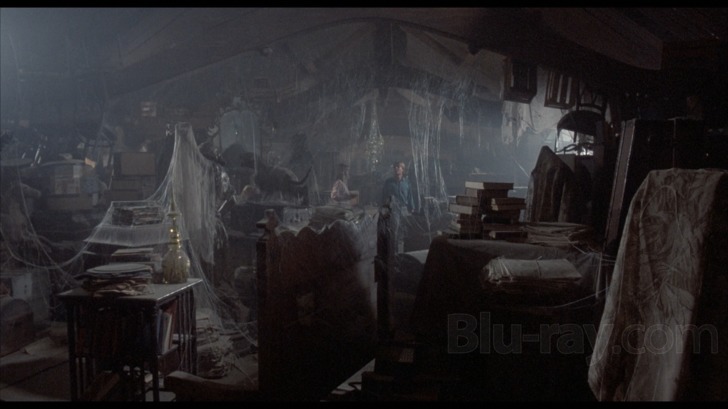
The film's original mono soundtrack is presented in lossless DTS-HD MA 2.0, with identical left and right channels. For a mono track, it's remarkably robust, with good dynamic range that allows the somewhat melodramatic score by Christopher Young (Drag Me to Hell, Hellraiser) plenty of room for expression. The often overripe dialogue is always clear, as are the sound effects, many of which have the artificial quality of post-production dubbing. But that isn't the Blu-ray's fault. As an aside, Young was the producers' choice. The director wanted David Shire (All the President's Men and Zodiac, among many others).
Flowers in the Attic Blu-ray Movie, Special Features and Extras 
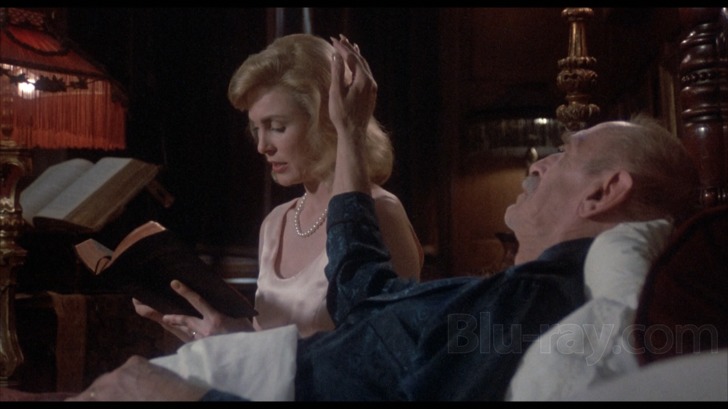
The disc contains no extras. The DVD released by Anchor Bay in 2001 contained a trailer, but Image's 2011 DVD was similarly bare.
Flowers in the Attic Blu-ray Movie, Overall Score and Recommendation 
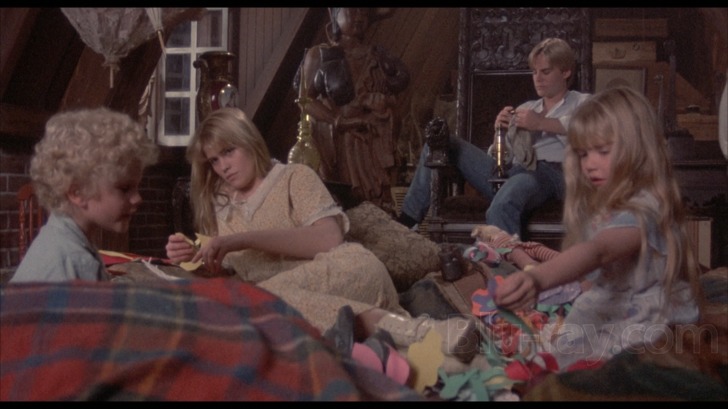
Flowers in the Attic isn't a particularly good movie, but it's an intriguing relic: an interesting, if unsuccessful, attempt to meld horror tropes with gothic atmosphere in an age, not that long ago, where some subjects still made film producers nervous. The Blu-ray is featureless, but the film looks about as good as it probably ever will. Buyer's choice.
Similar titles
Similar titles you might also like

Twice-Told Tales
Limited Edition Rerelease
1963

The Premature Burial
1962

The Sonata
2018

The Curse of the Crying Woman
La Maldición de la Llorona
1963

The Shadow of the Cat
1961

Winchester
2018

The Haunting of Hill House
Extended Director's Cut
2018

Voice from the Stone
2017

Dolores Claiborne
1995

Never Take Candy from a Stranger
1960

Libido
1965

Paranoiac
Collector's Edition
1963

A Bay of Blood
Reazione a catena
1971

The Hound of the Baskervilles
1959

Fear in the Night
Dynasty of Fear / Honeymoon of ... Fear
1972

Sister Sister
1987

Pyewacket
2018

Stonehearst Asylum
Eliza Graves
2014

The Other
Limited Edition to 3000 - SOLD OUT
1972

The Phantom of the Opera
Collector's Edition
1962
